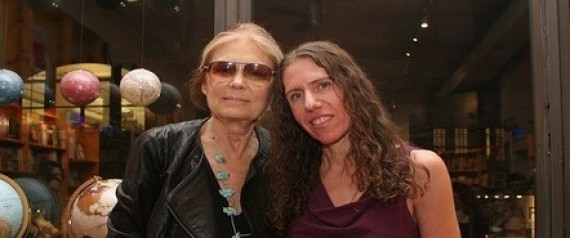
On March 25th, 2014, renowned writer, activist and global feminist icon Gloria Steinem, who last year received the Presidential Medal of Freedom Award for her enormous contributions to society, will celebrate her 80th birthday. I was an insecure and confused high school student when I first became aware of Gloria Steinem through the pages of my mother's issues of Ms. Magazine. She planted the first seeds of my feminist consciousness.
The first time I met Gloria was when I interviewed her at the March for Women's Lives in Washington DC in 1992 as a reporter for Us Magazine. I remember being moved and electrified by the eloquence, brilliance and passion of her words and commitment. This event triggered a personal epiphany for me and began my journey to advocate for women's rights and equality. I have since gone on to interview Gloria many times for a variety of media outlets (including the wonderful organization she co-founded, the Women's Media Center), and she has played an important role in my life as a friend and mentor as well as a longtime supporter of the 19-year-old women's website and non-profit organization I run, Feminist.com. Ever since the beginning days of founding Feminist.com, Gloria enthusiastically encouraged me and helped me to see the vast potential and power of the medium of the Internet to raise awareness, foster activism and create community.
Gloria has given me many powerful words of wisdom over the years, such as encouraging me to "ask for what I need" at a Feminist.com fundraiser/Salon on the State of Feminism that she graciously hosted. And at the launch party for my first book, Daring to Be Ourselves, which was also a celebration of Feminist.com's 15-year anniversary (where the picture above was taken), I will always remember when Gloria put her arm around me, looked me in the eyes and told me I should feel proud of this moment. I responded with a comment about how I was really just a conduit for helping promote other amazing thought leaders and organizations — and she gently stopped me and reminded me not to defer it outwards, but to take this moment in and to give myself credit and value my accomplishments. Asking for what we need and taking credit for our accomplishments are two messages many women and girls need today! I have treasured her words of encouragement and guidance, and they have definitely shaped my attitudes and actions. That is pure Gloria. Though she leads an incredibly full and busy life, she still takes the time to mentor and nurture the many people in her life in so many personal and caring ways. She is approachable, loving and warm to everyone she meets.
Last year, Gloria graciously helped design a beautiful bracelet with letter beads to benefit Feminist.com as part of Maiden Nation's ImagiNation campaign, which was inspired by Yoko Ono. When asked what slogan she would like to have on the bracelet, she came up with this powerful and profound phrase: "We are Linked Not Ranked. "
In celebration of her 80th birthday, I decided to go through my many interviews and share some of her inspiring insights and wisdom here. You can visit her website for more information about her work, her books and the organizations she is involved in and supports. You can also send a birthday message to Gloria and find out how you can attend a birthday bash in her honor, while supporting the organization she co-founded, at the Ms. Foundation's website. Her 80th birthday is a wonderful opportunity to celebrate Gloria and offer her our thanks as a positive force of nature!
"It would help not to treat age as if it were any less of a pleasure than it was when we were six and saying, 'I'm six and a half.' You know, we could be saying, 'I'm fifty and a half' and say it with joy. Each age is different and has different discoveries and pleasures."
On her wish for the children of the future: "The localization of everything. So there's no more violence in our families than we want to see in the world. So that we are eating locally instead of eating meals that have traveled for a thousand miles. So that the microcosm is what we wish the macrocosm to be."
On the message she most wants to instill in young girls: "That each of them is already a unique and valuable person when she's born; every human being is. Inside each of us is a unique person resulting from millennia of environment and heredity combined in a way that could never happen again and could never have happened before. We aren't blank slates, but we are also communal creatures who are born before our brains are fully developed, so we're very sensitive to our environment. The question is: How to find the support and the circumstances that allow you to express what's inside you?"
"We have to realize that young women's activism won't look exactly like ours because they've had different experiences, which is a good thing. One example would be safe and legal abortion, though many also recognize the threat to it, it's hard for them to imagine a world without it — but they're mad as hell that there's no comprehensive sex education, that the morning after pill is in contention, that pharmacists can just on a personal whim refuse to fill their prescriptions. They're angry about all of that. We all get radicalized by what affects us. Actually, younger women, just by the measure of public opinions polls, are more likely to support feminist issues than older women are."
On the word "feminist": "It doesn't matter what word we use, if it has the same content, it will be treated in the same way. There are other words, there's 'womanist,' there's "Mujerista", there's women's liberationist,' all mean the same thing and they get the same ridicule. I think we just need to choose what word we feel comfortable with that says women are full human beings, and whatever that word is, it will get a lot of opposition. But it will also attract a lot of support. But this is a revolution, not a public relations movement."
On having a female president: "It's important — because for one thing, little girls would look at themselves and women in a different way if they could imagine being the head of the country. It would free their hopes. And it would free the imaginations of little boys to see female and male authority. However, it doesn't necessarily change the structural problems just to have one person at the top."
"I've come to realize that the ancient cultures, the original cultures, which account for 95 percent of human time on Earth, were gender-balanced and balanced with nature. If it happened before, it can happen again. The Native American cultures were probably the inspiration for the suffragist movement, for instance. To understand that for 95 percent of human history it was different is very helpful to me in believing that it can be different in the future."
"First of all, change is like a house: you can't build it from the top down, only from the bottom up. Whatever small change we make will be like a pebble in a pond. It will reverberate outward. We're meant to be active and contribute to the world. What's the alternative? Just sitting there and wondering, 'Oh, if I had just done this, maybe...' I've learned only one thing: no matter how hard it is to do it, it's harder not to do it. Then you're stuck with wondering, 'What if I had said...? What if I had done...?"
"I just do the best I can and try to make some balance between what needs doing and what I can uniquely do."
"We're changing ourselves to fit the world instead of changing the world to fit women."
On the need for diversity in the media: "If you can't see it, you can't be it — so unless you see your life and your group and your experience reflected, you think you don't belong, you're powerless, you can't act — consciousness comes before practical change usually. And the media is our consciousness."
"Once men realize that the gender roles are a prison for them, too, then they become really valuable allies. Because they're not just helping someone else, they're freeing themselves. There is a full circle of human qualities we all have a right to, and they're confined to the "masculine" ones, which are seventy percent of all of them, and we're confined to the "feminine" ones, which are thirty percent. We're missing more, but they're still missing a lot. If a man fights to be his whole self, to be creative, express emotions men are not supposed to express, do jobs men are not supposed to do, take care of his own children, all of these things are part of the feminist movement."
"The source of all my energy is other people, mostly women, but some men, too. I'm very lucky because I can work full time at what I love and care about, so I am constantly able to talk to people who care about similar things. It's much more difficult for women who are in families that oppose them, who are in offices that ridicule them. I have a community wherever I go."
"Hang out with people who make you feel smart, not dumb. That's crucial. Because if they make you feel dumb, they're not supporting you and they're not helping you. It isn't that we're right or wrong. It doesn't have to do with being right all the time, but if you have consistency of support from people who value your opinion, it will help you to value your opinion. We're communal people. You can't do it by yourself."
"If we're by ourselves we come to feel crazy and alone. We need to make alternate families of small groups of women who support each other, talk to each other regularly, can speak their truths and their experiences and find they're not alone in them, that other women have them, too. It makes such a huge difference."
On her life philosophy: "Some people live in the past, some people live in the present, which is probably the most rewarding, and some people live in the future. I live in the future, so I am always thinking, 'What if?' or 'This could be' or 'This could change' or trying to understand why something happens. The great joy to me is that moment-that 'aha!-when you think, 'Oh, that's why!' That excitement and pleasure in realizing why something is happening, how it could be different, that definitely keeps me going."
When asked if she is optimistic: "Yes, I'm optimistic. But I also know nothing will happen automatically. Change depends on what you and I do every day."
You can visit Gloria's website at www.gloriasteinem.com
This interview originally appeared at The Huffington Post
BACK TO INSPIRING CONVERSATIONS MAIN PAGE
Other interviews by Marianne Schnall
***

Marianne Schnall is a widely-published interviewer and journalist and author of What Will It Take to Make a Woman President?, Leading the Way, and Dare to Be You. She is also the founder of Feminist.com and What Will It Take Movements and the host of the podcast ShiftMakers.
Follow Marianne on Twitter @marianneschnall